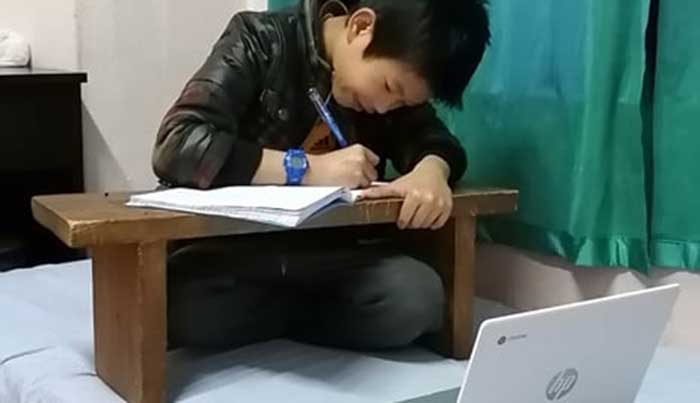“It takes a community to raise a child” is resonant to the e-learning programme the government has initiated in the light of the new coronavirus.
The education of a child is a shared responsibility between the teacher and the student, parents, as well as the community as a whole, working together in solidarity.
Often, it is easier to stand outside a pond and reflect on the dirt that lies within, than to muster the courage to stir the mud and nurture growth.
Credit is due to the teachers who stand live- probably for the first time in their lives- teaching online. To the students who eagerly wait for their day’s lessons, and to the parents who reschedule their day to day routines to facilitate this long overdue foray into revolutionising the education system that has remained virtually unchanged- not just in Bhutan, but the world over- for more than a century.
Despite the foreboding presence of hushed dubious voices, mixed with fear and apprehension at the idea of not being able to meet expectations, the online lessons have gone into full swing.
“Our demo lessons went so smooth, that we felt well prepared to face the camera, but eventually, when the camera lights focused on us, we suddenly felt overwhelmed,” said one of the teachers involved in the online classes.
Some other teachers were of the opinion that teaching in classrooms was more comfortable than doing so facing a camera; that the shift in teaching took a more formal exterior and became less interactive. However, they also added that this new dimension to teaching has enriched them.
While some students felt that e-learning was fun and wished for the continuance of the project, others expressed their concerns over not having accessibility to the internet or even a basic television set at home. These concerns were primarily shared by children in the more remote corners of the country.
No two sides of a coin have ever been the same. So is the case with the e-learning program.
The sudden emergence of e-learning can be taken as a renaissance for the Bhutanese education system to move forward.
It gives us an opportunity to shift from the more institutionalized form of learning to a more open arena. One in which students can develop the ability to be broader in their thoughts, teachers gain exposure and develop the confidence to explore different mediums of instruction and parents, in turn, become more instrumental in their child’s learning.
In fact, a whole nation is aroused and made more conscientious on the importance of coming together, to solidify for our children, their rights to a tomorrow with boundless potential.
All this can become a reality if each of us felt, and acted upon a communal responsibility to raise our children in the best possible manner. The apparent crippling realities of the lack of a smart phone or even of that which is considered a necessary accessory in most urban homes, a television set, may instill a lack of conviction in the viability of e-learning in the minds of many a doubter, but I would like to think that these are hurdles that our little nation can overcome, given time, and given belief.
Consistencies and continuity can come into place, if all come in unison to raise our children. If each, instead of finding means for negative criticism, lent a hand not as an individual apart, but as a voice in solidarity, to further enhance one another. Even now, in the face of adversity, our children adapt.
Those without television sets at home visit neighbours to facilitate their e-learning, all the while hoping for the assistance promised by our government. If the children can be so optimistic and pursuant to gain a day’s lesson, why cant society, instead of standing by the wall, ready to shred apart anything new, come together for a change and build upon the initiatives that have already been taken to create an educational culture that engenders the brightest of futures for them.
If Parents could be by their children guiding them, with their lessons, taking advantage of gaining more insight on their child’s learning, or if in the event a parent, who is not fortified enough, to guide their child, sought neighborly assistance, if as a teacher, we bore accountability to our profession, if as a society we did not always look for means to down size the efforts of those struggling, if as committed stake holders would look into the inadequacies and meet them with efficiency.
If and if, the beginning of all changes, the birth of all changes, looming around the cornerstones of that ‘if’,
That it is not just a child but our child, our child’s future that we have to ensure, to reciprocate the trust, that they have placed in us, with their tomorrow.
Contributed by
Pema Gyaltshen
(Teacher)


